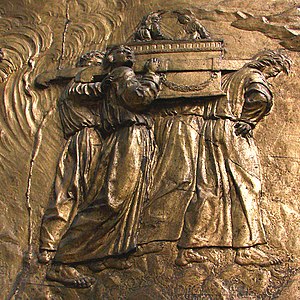 Image via Wikipedia
Image via WikipediaDuring his years as the leader of Israel, as God’s spokesman to Israel, Samuel always strove to bring his people into a closer relationship with God. In many ways, his message was the same as that of Moses. He continuously admonished the nation to forsake the worship of foreign gods and to return wholeheartedly to the God of Abraham, Isaac and Jacob.
Twenty years had passed since God judged the house of Eli, the priest; twenty years passed since the Ark of the Covenant was housed in an Israelite village of Kireath Jearim; twenty years passed since the Philistines slaughtered thirty thousand Israelite soldiers in a devastating battle. As Israel continued to be oppressed by the victorious Philistines, the nation mourned and began to seek God. In response to this, God led Samuel to call the nation together in Mitzpah, first mentioned in Genesis 31:49, in order to repent, fast, pray, and worship the God of Israel. The word mitzpah, or watchtower, came out of Jacob’s and Laban’s deep distrust of one another. They parted company by establishing a boundary that neither would cross. Although the name originated from hostilities, it can be understood as invoking the idea of the Watchtower which represents One who watches all, the God of Israel. Israel congregated where there was a sense of being seen and heard by the King of the Universe.
As the prophet Samuel led the nation in penitence and worship, God routed the Philistines who again assembled to slaughter Israel. Samuel military victories came out of worship and out of his absolute allegiance to the God of Israel. This military victory gave Israel a few more decades of peace from the Philistines.
As the aging prophet, Samuel, tried to confer his responsibilities onto his sons, Israel clamored for a king. Following God’s direction, Samuel anointed Saul, son of Kish, from the tribe of Benjamin, as the first king of Israel. After the anointing, Samuel communicated God’s Will to Saul through a series of validating signs and directions concerning an event to occur at some point in the future. (1 Samuel 10: 1-8)
Years passed since Saul was anointed, since the signs were realized. However, as Saul prepared for a major battle against the Philistines, his troops were called to assemble at Gilgal, the city about which Samuel prophesied to Saul. Saul fully understood the significance of the city and the battle, however as he waited impatiently for Samuel to arrive in order to worship the Lord, Saul became more fixated on the number of soldiers deserting him than he was on patiently waiting for the prophet to come as he promised he would. Finally, exasperated that Samuel hadn’t yet arrived, Saul took matters into his own hands and offered burnt offerings to the Lord. When he did this, he showed all of Israel that he didn’t really honor God as his king; he didn’t really regard God with reverence and awe; he trusted in his own assessment of military dissolution rather than trusting in God’s ability to bring about a victory even if only one soldier were left in his command.
Saul publicly disobeyed God, and so lost the kingdom that as offered to him.
Obedience is not so much about following rules as it is about trusting in God’s character and in His word. When we trust who God is, then how we live and what we do is a natural reflection of God’s love, which is also expressed in His law.

No comments:
Post a Comment